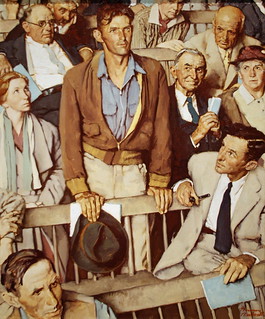| Freedom of Speech (Photo credit: cliff1066™) |
Most of us realize that freedom of speech does not mean that one is free to say whatever one wishes without experiencing any negative consequences whatsoever. If you use your freedom to insult someone, he or she may turn around and use his or her freedom to insult you right back. And as we have seen again and again, if you use your freedom to broadcast something incredibly stupid on the Internet, it is quite likely that someone will use his or her freedom to express disagreement or even mock you.
It works this way because we all share this particular freedom. Freedom of speech applies to everyone, and not just to people who agree with us or who are on our side in various political issues. Defending free speech includes defending it when it is used to express ideas we do not like.
But here's the thing: it seems like there is a point at which the negative consequences one experiences could become so severe that we might begin to consider them to be somewhat coercive. And as they become increasingly coercive, what we want to call freedom seems to erode. This is one of the things I find concerning about political correctness.
Imagine an individual of high status (i.e., power, wealth, social standing) adopting the following position:
Yes, you are free to criticize me, but if you attempt to exercise this freedom in any meaningful way, I will destroy you. I will entangle you in multiple lawsuits, use my platform to shatter your reputation and turn others against you, and be sure that you not only lose your job but that nobody would dream of hiring you in the future. Say what you want to say but know that your life will never be the same if you speak out against me.
Assume that such a person could make good on most of this threat. This strikes me as coercive in the sense that it could reasonably be expected to silence critics. Would a potential critic still have the right to criticize such a person? Technically, yes. But how much does that right mean if the threat is legitimate? How free is our potential critic really? As the consequences become increasingly coercive, don't we eventually get to something like the scenario where someone is technically free to murder someone even though doing so means life behind bars?
If the government were to criminalize certain forms of speech, you would still be free to use them; however, your use of them would land you in prison. Most of us would have trouble viewing this as free speech. Similarly, someone is technically free to speak out against our hypothetical high status person above. But again, most of us would have trouble viewing something this coercive as free speech.
If I identify myself as an advocate of free expression and then try to get someone fired, shunned, or silenced when he or she expresses something I do not like, wouldn't that make me a hypocrite? I can certainly express my disagreement with what someone has said without going on a crusade to ruin his or her life for doing so. If I claim to value diverse viewpoints and then seek to punish those who express viewpoints different from my own, doesn't that make me a hypocrite? I can certainly promote my viewpoint and criticize someone else's without trying to punish anyone for promoting a viewpoint I do not like.
Freedom of speech does not mean freedom from consequences; however, the consequences we envision should not be so coercive that they serve to erode the very freedom we claim to value.
